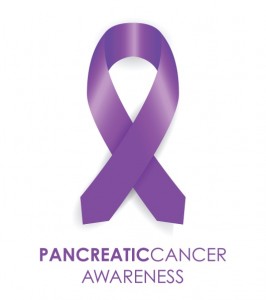Pancreatic Cancer Awareness
Pancreatic Cancer Awareness All Year Long
 Pancreatic cancer is one of the most difficult types of cancer to treat, but ongoing medical advances are giving new hope to those diagnosed. The Pancreatic Cancer Action Network seeks to increase understanding and awareness of pancreatic cancer, support people managing this cancer, and raise funds for research into pancreatic cancer treatments. November was National Pancreatic Cancer Awareness Month, but it’s important to raise awareness all year long.
Pancreatic cancer is one of the most difficult types of cancer to treat, but ongoing medical advances are giving new hope to those diagnosed. The Pancreatic Cancer Action Network seeks to increase understanding and awareness of pancreatic cancer, support people managing this cancer, and raise funds for research into pancreatic cancer treatments. November was National Pancreatic Cancer Awareness Month, but it’s important to raise awareness all year long.
Awareness Is Half the Battle
Each year, more than 43,000 Americans are diagnosed with pancreatic cancer. Just as with other forms of cancer, early detection is vital to the successful treatment of pancreatic cancer. However, pancreatic cancer often doesn’t have any symptoms in its early stages. When symptoms do emerge, they can be so vague that patients and their doctors don’t realize that pancreatic cancer is a possibility.
Nov. 13, 2014 was the first annual World Pancreatic Cancer Day, sponsored by the Pancreatic Cancer Action Network to foster awareness of this often difficult-to-treat cancer. Awareness of early symptoms increases the chances of successful treatment for pancreatic cancer.
Know the Early Symptoms of Pancreatic Cancer
Do you know the early warning signs of pancreatic cancer? This type of cancer can cause a wide range of symptoms that can be hard to pinpoint. If you have two or more of the following symptoms, you could be experiencing the early stages of pancreatic cancer:
- Abdominal pain. Pain in the upper abdomen occurs when pancreatic tumors apply pressure to nerves.
- Yellowing of the skin and eyes accompanied by darkening of the urine occurs when pancreatic cancer impairs liver function.
- Weight loss. Many patients chalk weight loss up to stress, or even improvements in diet and exercise, but it’s often a result of pancreatic cancer. Weight loss may be accompanied by vomiting, nausea, or loss of appetite.
- Recent research from the Mayo clinic suggests that as many as 40 percent of pancreatic cancer patients are diagnosed with diabetes one to two years before being diagnosed with pancreatic cancer. Undetectable pancreatic tumors may be to blame for diabetes in these patients.
- Itchiness of the skin. Jaundice can cause the skin, soles of the feet, and palms to itch.
- Taste changes. Some research suggests that people in the early stages of pancreatic cancer may lose their taste for tobacco, coffee, or alcohol.
- Gall bladder enlargement. Just as pancreatic tumors can interfere with liver function, they can also cause bile to accumulate in the gall bladder, causing it to become enlarged.
- Change in stools. Pancreatic cancer can keep important digestive enzymes from reaching the intestine, causing a change in stools. Stools may become especially smelly, buoyant, or looser than usual. If cancer causes bleeding in the intestinal tract, stools may become dark in color and tarry in appearance.
 If you think you might be experiencing the early stages of pancreatic cancer, remember that treatment is possible. SBRT has been used successfully to target pancreatic tumors and kill them with radiation, even in patients who aren’t considered good candidates for surgery. SBRT is just as effective as surgery for eliminating cancerous tissue.
If you think you might be experiencing the early stages of pancreatic cancer, remember that treatment is possible. SBRT has been used successfully to target pancreatic tumors and kill them with radiation, even in patients who aren’t considered good candidates for surgery. SBRT is just as effective as surgery for eliminating cancerous tissue.
When it comes to fighting pancreatic cancer, knowing the early warning signs is key. Even though National Pancreatic Cancer Awareness Month is over, you can still participate by educating your family and friends on the early warning signs of pancreatic cancer, or hosting an awareness event in your town.
